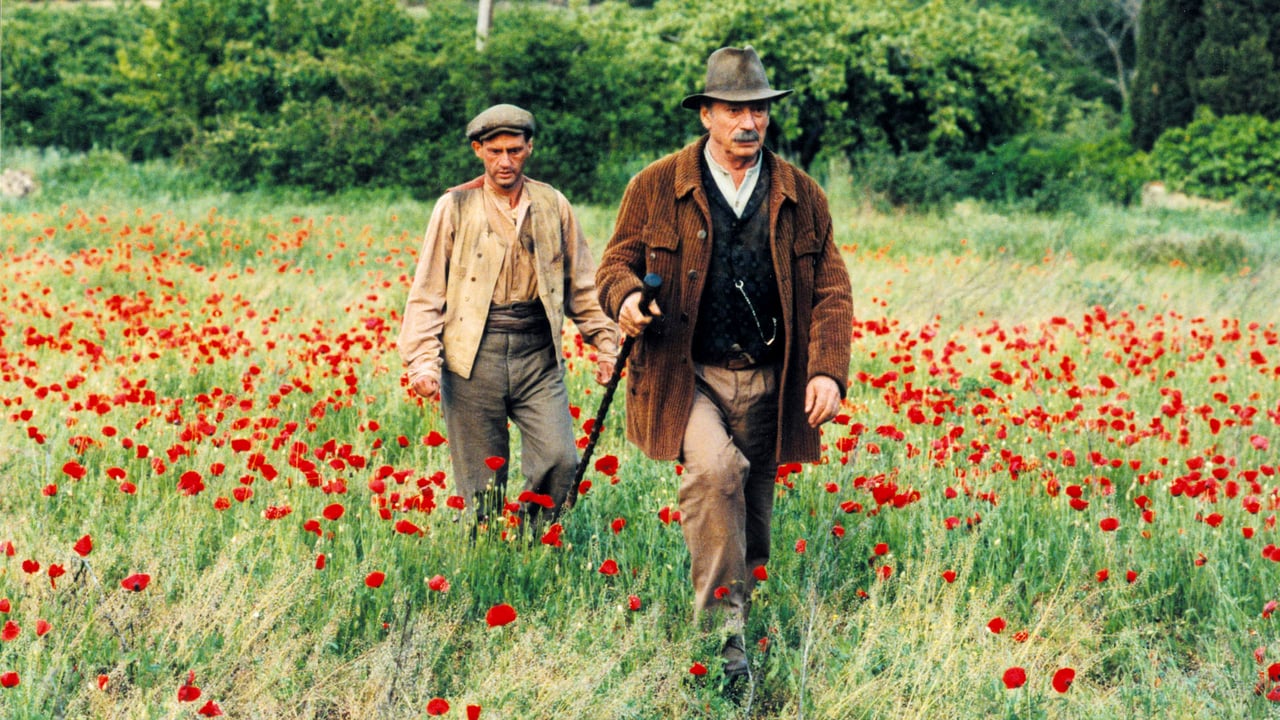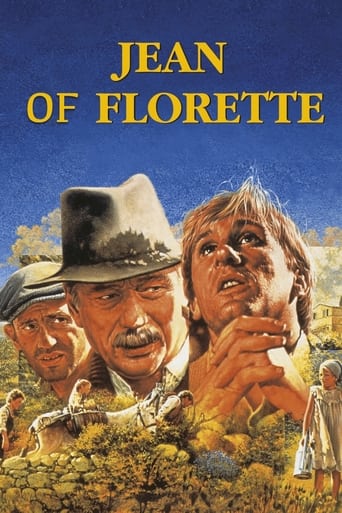Twilightfa
Watch something else. There are very few redeeming qualities to this film.
Aubrey Hackett
While it is a pity that the story wasn't told with more visual finesse, this is trivial compared to our real-world problems. It takes a good movie to put that into perspective.
Anoushka Slater
While it doesn't offer any answers, it both thrills and makes you think.
minituttle
Rarely has a movie touched me so deeply! The characters are all very well played, the story is somewhat basic but sooo true, very far from all of today's Hollywood-style movies full of stunts and special effects.This movie made me travel through time and live in a decade I have not so well known.Watching it in its original version only made it better with the actors portraying their character's feelings and emotions to perfection.I highly recommend this movie to anyone who wants to have a good time, alone or with friends or family.Nice twist at the end of the second part (Manon of the springs) as well.Really, really worth watching in my opinion.
Red-Barracuda
Jean de Florette is the first of a two-part French period drama from director Claude Berri, concluded by Manon des Sources which was also released the same year. It should be stressed that both films need to be watched together, as individually they will not entirely make sense. This first part sets the scene and is by far the more downbeat of the two films. Set in the 1920's in south-east France in a rural community based in a mountainous region, the story centres on a city man, a hunchback called Jean de Florette, and his family who inherit an estate in the hills. His neighbours Cesar and his nephew Ugolin Soubeyran covet this property and try every underhand trick to force Jean off the property, including blocking the precious spring that his land depends on. As a result of their actions, as well as the complicity of the local villagers, Jean experiences ever increasing levels of stress and bad fortune in trying to make his new life work out.This is a good example of the 'cinema of quality' from France, incidentally a type of traditional film-making in which the young upstarts from the cinéma du look movement were making films in direct opposition to. But I think it's only fair to say that, while it may be an obvious bit of commercial French cinema, it's also a very good example of it. The story-line is its strong point with themes of greed and prejudice, coupled with what can happen when bystanders do nothing when they witness bad deeds. The story is well presented with strong characterisation and excellent acting, especially from Gérard Depardieu as the optimistic and naive Jean, and with Yves Montand and Daniel Auteuil acting as the well-drawn villainous neighbours. Add to this some attractive photography of the natural pastoral landscape, with the famous melancholic score adding a further dimension. It all adds up to a quality bit of cinema and a great appetizer for the second part of the story.
TheLittleSongbird
Having been so blown away by Cyrano De Bergerac, I also watched Jean De Florette, also starring Gerard Depardieu. Jean De Florette is a very different film, but every bit as fantastic. Depardieu is very endearing in a performance that has in his career only been surpassed by Cyrano De Bergerac to me. Yves Montand and Daniel Auteuil are also outstanding as the scheming Soubeyrans. The acting is not Jean De Florette's only good asset. This is an example of a film where everything works. The story is beautifully paced and evocative, the script is witty and very cinematic, the cinematography shimmers, the scenery is breathtaking, the music is lively yet again very understated and the direction does wonderfully in capturing the pace of the seasons changing and Provence's unique atmosphere. All in all, I love this movie just as much as Cyrano De Bergerac, and I am watching Manon of the Spring(and loving it) even as we speak. 10/10 Bethany Cox
zjerunk
I have many favorites, and this is one of the crème de la crème. This is a visually stunning film more like beautiful photographic montage. It is simple, tragic story well told, unlike many of today's plots - implausibly lame, suffering on a CGI crutch for 85 minutes. The simple story is about enduring truths which have been the mainstay of the Greek classics and Shakespeare: Our human strengths, our failings, our virtues, and our vices. The story may be a fiction, but its kernel is not. It is stories and story telling like this which has kept our rapt attention for four thousand years.First we should understand that this film is only the first half the novel by Marcel Pagnol which would have been too long as a single film, and out of necessity, was shot as two. The second half is titled, Manon of the Spring. Neither film stands alone as satisfactory because, obviously, it would be incomplete, and naturally, is also important that the two halves be viewed in sequence. For a fairly dispassionate précis of the plots, I suggest reading the ones on Wikipedia, so I won't be repetitive here. I also recommend reading the boards for comments and discussions.JdF & MotS were both shot at the same time in 1986 with a budget of $17 million making it/them the biggest budget French films up to that time. JdF grossed $86M worldwide, and of that sum, only $4.9M was from the USA. MotS grossed $56M worldwide, of which only $3.9M was from the USA. In other words, culture films are not a good fit for the American viewing audience, and the gross revenue numbers bear this out. The rest of the world seems to bear out this conclusion.Foreign language films rarely do well in the USA for the simple reason that the vast majority of the viewing audience are unilingual anglophones who do not wish to burden themselves with having to work at "understanding" their entertainment - they wish to merely consume it. If it requires the work of reading subtitles or thought, it becomes unpalatable. This film requires your attention and thought!But to be fair to the US viewers, the subtitles are at times incomplete or inaccurate, and unlike the spoken word, they do not convey the emphasis or importance of certain bits of dialogue well. The plot is woven steadily throughout the film, so the viewers with no understanding at all of the French language are missing essential dialogue, and therefore plot.The bottom line is this: You will either be entranced by these two films and love them, or you will be bored by the first 15 minutes, and you'll translate that into "bad film." If your highest quality level of reading is Marvel comics then I suggest you stay away from this one.However, I recall years ago walking into a video store where this was playing on all the monitors. All the patrons in the store, ranging in age from 5 to 75 years, were standing transfixed watching this film. There was something magical about it!

